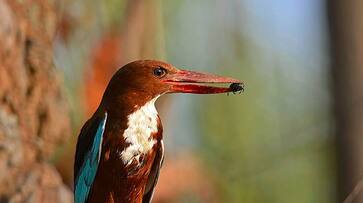WED 2016: Wildlife conservation takes priority

Skyrocketing pollution levels, declining forest cover and an increasing number of endangered species has made environment conservation the need of the hour.
World Environment Day (WED), which is observed on June 5 across the world, has become a global platform for a public outreach that is widely celebrated in over 100 countries. Every year, the WED is organised around a theme that reflects a pressing environmental concern. According to the United Nations official WED website, the theme for this year focuses on the illegal trade in wildlife under the slogan 'Go Wild for Life'
When the entire world is gearing up to celebrate this day, Asianet Newsable spoke to environment enthusiasts about the changes that the city has witnessed over the years.
An IT professional in Bangalore, Prashanth Kumar, 36, has been passionate about bird watching, a hobby he took up two decades ago.
"I've been bird watching since 1994 and I've seen a lot of changes in the environment then and now. Today, we have just a few pockets of green cover in the city like Cubbon park and Lal Bagh. I have to go deep into Bannerghatta national park to spot rare birds, unlike before when these species were easily seen," he said.
He adds, "There is a decline in bird migration because of water bodies being polluted. Even water birds like Coromant, White breasted kingfisher, Grey heron and other such species are hard to spot."
"The forest department's job has become to cut down trees now and not conserve forests. Officials in these posts are linked to lucrative activities like poaching and illegal felling of trees. I'm sure no rare birds have been rescued by the department in over two years," Prashanth Kumar, IT professional.
Speaking on the issue of dead fishes floating in Ulsoor lake, Prashanth points out that sewage is not the only reason for pollution. When certain species of fishes are introduced to the lake's ecosystem, it causes an imbalance, which also affects the bird population in that area, he claimed.
Kumar, who indulges in bird watching at least once a week, said, "To make more profits, big fishes are introduced in the lake which causes an imbalance in the lake's environment, indirectly affecting the bird population in these areas. Raptors (hunting birds) that migrate to these lakes can no longer feed because they cannot prey on the tiny fishes that earlier existed in the lake."
To create awareness about conservation, Bannerghatta zoo director Santhosh Kumar has encouraged citizens to take an interest in wildlife. He said, "Zoos play a vital role in creating awareness about animal conservation. When people visit zoos, they develop compassion for wild animals and think about their conservation."
Let us hope this year at least, we go beyond empty slogans and 'Facebook Likes' and actually do something to preserve what little is around us.
Photo courtesy: Prashanth Kumar
















